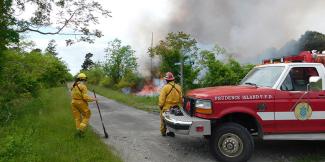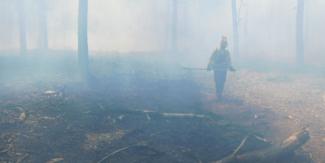Forest Fire Program
Serving Rhode Island citizens through prevention, planning, and response, the mission of the Rhode Island Division of Forest Environment’s (DFE) Forest Fire Program is to aid fire departments, as well as the public, with wildland fires. Fire can be beneficial to the environment but, when it occurs uncontrolled in and around homes and communities, it can pose a threat to life and property.
The Forest Fire Program is dedicated to aiding local fire departments in mitigating wildfires, while working with partnering agencies to introduce controlled fire into RI’s environment, as well as providing grants to Volunteer Fire Departments to assist with purchase of equipment to control wildland fires, and administering a fire hose loan program. The Fire Program also provides information about protecting homes and property from wildland fire.
DFE is an active member of the Northeast Forest Fire Protection Compact (NFFPC), a mutual aid group includes New England, New York, FDNY, as well as the Canadian members of Quebec and the Atlantic Provinces. Rhode Island Forest Rangers are trained to the standards of the National Wildfire Coordinating Group (NWCG) and agency specific. Partnerships through the NFFPC and other organizations like the North Atlantic Fire Science Exchange is valuable regional resource for research and training also.
Through training and partnerships, DFE is able to provide training and guidance to fire departments in Rhode Island.
Fire Department Assistance
DFE works closely with volunteer fire departments to mitigate wildfires, provide training, and offers a variety of specific programs and services to assist VFDs.
- Fire Weather Information
- Training for VFDs
- Fire Reporting
- Fire Hose Loan Program
- Dry Hydrants
- Videos
- Smokey Bear Costume Loan
Request EMERGENCY Response/Equipment:* Call DEM Enforcement at 401-222-3070. The dispatch center will contact the DFE duty officer who will dispatch units to best meet the requested services.
*This does not include hose exchange.
Fire Incident Report/Hose RequestCommunity & Homeowner Resources
Rhode Island has a history of wildfires and, while less common in recent years, increasing temperatures and population density means that a wildfire can threaten properties.
Communities can work with DFE Fire staff to plan and implement fuel reduction, become a Firewise® USA site and be firewise.
Learn MoreWhile many homeowners are aware of the risk of house fires, they often overlook their outside surroundings. Be prepared by assessing your home and property to reduce the risk of wildfire spreading to your home and buildings.
Learn MoreVolunteer Fire Assistance (VFA) Grant Program
The Volunteer Fire Assistance (VFA) Program is a federally-funded program administered by DEM’s Division of Forest Environment (DFE). Managed by the DFE Forest Fire Program, these matched funds help fire agencies meet their firefighting and emergency response needs.
Other Resources

Human experience with wildfires has provided many lessons, often hard lessons with loss of lives. For many years fire has been treated as a public threat with a policy of stopping any and every fire, just like Smokey Bear says.
As fire was suppressed, forests changed. Periodic fires no longer removed fuels like deadwood and brush, resulting in the build up of fuels that burned hotter and spread faster and farther. This has led to the study of fire for a better understanding of fire and its management, including the use of prescribed fire as a tool to reduce the likelihood and the severity of wildfires.
Prescribed fire, or controlled burns, are carried out with planning and monitoring, and with specific objectives, such as:
- to reduce the fuels on the ground so that should a wildfire occur, there is less fuel available to burn which can slow the rate of spread and the size and heat of the flames.
- to improve wildlife habitat for specific species by removing invasive plants or understory growth.

Even Smokey Bear recommends prescribed fire. And DEM’s Division of Forest Environment is working to carry out prescribed fires on state land.
For more information about prescribed fire check out: GoodFires.org.
Questions? If you own wooded property and are interested in understanding more about the applications of prescribed fire you can find more in-depth information about Reasons for Prescribed Fire. Contact your local fire department for more information and for burning permits.

In Rhode Island, many communities are served by a local volunteer fire department. They rely on volunteers to provide firefighting services to protect property and life. But these departments are also the first responders to wildfires.
Structural fires are very different from wildfires, and volunteer firefighters need to be trained how to safely fight wildfires, just as they need to be trained to respond to hazardous material incidents and fires. Each type of fire has its own behavior, and risks, and requires knowledge to respond in a safe and effective manner.
The Division of Forest Environment provides wildfire training to volunteer fire departments, when requested.
- Ask your local fire department if they are trained to respond to wildfire.
- Encourage your community and local fire department to undergo wildfire training.
- Consider how you can be involved with your local volunteer fire department, as they rely on residents to maintain the staffing and the ability to protect the community.
Questions? If you are interested in learning more about wildfire training for your local fire department, contact Principle Forest Ranger Ben Arnold at ben.arnold@dem.ri.gov.
The American Planning Association (APA) has developed the Multihazard Planning Framework for Communities in the Wildland-Urban Interface which lays out a comprehensive framework that:
- addresses risk from wildfire and other hazards
- encompasses scales from site to neighborhood, community, and region
- identifies a range of planning interventions that can be used to reduce risk and maximize the benefits that forests provide across the scales of concern

Many communities that are surrounded forests have developed a Community Wildfire Protection Plan (CWPP). As defined by the National Wildfire Coordinating Group, a CWPP is developed by local stakeholders to identify and prioritize areas for hazardous fuel reduction treatments and recommend the types and methods of treatment to protect the community and essential infrastructure. The CWPP recommends measures to reduce structural ignitability throughout the community, and may address all or some issues, such as: wildfire response, hazard mitigation, community preparedness, structure protection - or all of the above.

In Rhode Island, Prudence Island developed a CWPP in 2018, with funding from the USDA Forest Service and assistance from DEM’s Division of Forest Environment, including over 100 acres of prescribed burning as the initial implementation of the plan.
Questions? If you are interested in learning more about planning and preparation for wildfires, contact Forest Fire Program Coordinator Olney Knight at olney.knight@dem.ri.gov.




